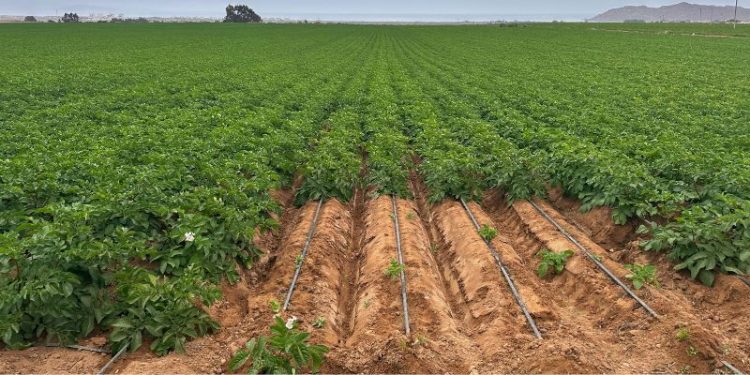New Life Cycle Analysis Reveals Drip Irrigation’s Advantages in Reducing Global Warming Potential and Water Usage for Potato Cultivation
According to a recent report by Potatobusiness, a comprehensive Life Cycle Analysis (LCA) conducted by Netafim demonstrates the significant environmental benefits of adopting drip irrigation systems for potato farming. The study, carried out in collaboration with Potato Solutions and Drip UK, underscores the effectiveness of drip irrigation in reducing the Global Warming Potential (GWP) and conserving water compared to traditional rain gun irrigation methods.
Key Findings from the Life Cycle Analysis
The LCA, which was performed in Norfolk, East Anglia from March to October 2022, highlights the substantial environmental advantages of drip irrigation for both fresh and processed potatoes. The study specifically focused on comparing the impact of drip irrigation versus rain gun irrigation on several environmental metrics, with a strong emphasis on sustainability and efficiency.
1. Significant Reduction in Global Warming Potential
One of the most notable findings from the LCA is that drip irrigation systems result in a 54% reduction in the GWP for fresh potatoes compared to rain gun irrigation methods. The GWP metric, as defined by the Intergovernmental Panel on Climate Change (IPCC), measures the amount of heat trapped by greenhouse gases in the atmosphere over a specified period relative to carbon dioxide. By significantly lowering the GWP, drip irrigation emerges as a crucial technology in the fight against climate change, offering a path towards more sustainable agricultural practices.
2. Improved Water Efficiency
The study also revealed that drip irrigation uses 40% less water per ton of potatoes for processing compared to rain gun irrigation systems. This finding underscores the technology’s role in conserving water resources—a critical consideration given the growing global concern over water scarcity. Drip irrigation’s efficiency in water use helps address one of agriculture’s most pressing challenges while supporting the sustainability of potato farming operations.
3. Drip Irrigation as a Solution for Water Scarcity
Tim Kitson from Potato Solutions emphasized the adaptability and effectiveness of drip irrigation, particularly in regions experiencing water scarcity. Drip irrigation systems provide precise water application, which not only conserves water but also ensures that potatoes receive the necessary moisture for optimal growth. This approach supports farmers in managing water resources more effectively, especially under the threat of climate-induced water shortages.
4. Commitment to Sustainable Agriculture
Max Moldavsky, Director of Innovation and Climate Solutions at Orbia Netafim, highlighted that the findings from this LCA study align with the broader goal of advancing sustainable agriculture practices. Drip irrigation technology not only supports environmental conservation efforts but also helps farmers meet increasing demands for efficient and eco-friendly farming methods. Moldavsky’s comments reflect a broader industry trend towards integrating innovative technologies to achieve sustainability in agriculture.
5. The Future of Potato Farming with Drip Irrigation
The LCA study reinforces Orbia Netafim’s dedication to promoting sustainable agricultural practices through precision irrigation technologies. By demonstrating the environmental benefits of drip irrigation, the study advocates for a shift towards more sustainable farming practices that balance productivity with ecological stewardship.
Implications for Potato Growers and the Agricultural Industry
For potato growers, the LCA findings present a compelling case for investing in drip irrigation systems. The environmental and operational advantages of drip irrigation—such as reduced GWP and improved water efficiency—make it a valuable tool for modern potato farming. As the industry continues to face challenges related to climate change and resource management, the adoption of drip irrigation offers a practical solution for achieving long-term sustainability goals.
Growers are encouraged to consider the benefits of drip irrigation for both current and future potato cultivation projects. Embracing such technologies not only supports environmental conservation efforts but also positions farmers to meet market demands for sustainable production practices.






